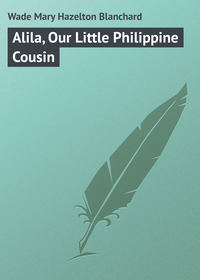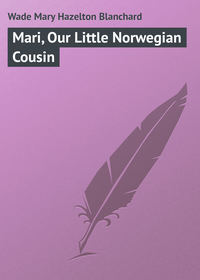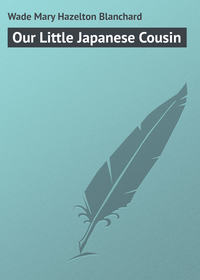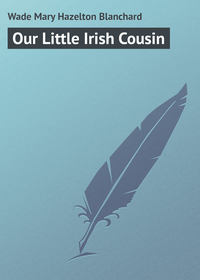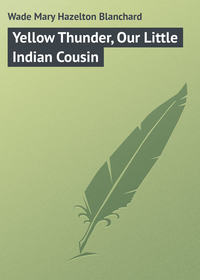 полная версия
полная версияMpuke, Our Little African Cousin
CHAPTER IX
THE GORILLA HUNT
AFTER many hours the hunters return. They have a wonderful tale to tell of what they have seen and done. Mpuke's father is the story-teller. The black faces of the listeners are very still, and all eyes are turned toward him as he speaks. He says:
"My people, we hunters went away from this village very quietly, as you all know. We did not wish the creatures of the forest to hear us as we crept along, one behind another. Our enemies, the gorillas, must not learn of our approach.
"We went on and on, farther and farther to the east. There was no path; we broke off twigs and leaves from the trees and scattered them along on the ground, so we should be able to find our way home again."
Here the whites of the chief's eyes grew larger and rounder as he rolled them about in his head, and looked from one to another of his listeners. Then he continued:
"As we moved on through the forest, we stopped from time to time to listen. But there was no sound of the great gorillas' feet stamping upon the ground. There was no shaking of the limbs of trees. They could not be there.
"At last we came out of the forest into a wooded marsh. The mud was so deep that our feet sank far in at every step. It was a very bad place for us if we should need to run, but it was the very spot gorillas would like if they were in search of dinner, for there were great numbers of bushes loaded with berries, of which, you know, the fierce gorilla is very fond, as well as of other fruits and nuts.
"Hark! there was a sound of tramping feet. The ground trembled, and straight ahead of me I counted one, two, three full-grown gorillas. Two of their children were following them. They were moving along through an open space in the bog. Now they went on all fours, and again they would raise their great bodies and walk along, even as we do ourselves.
"They looked around, now and then, turning their ugly, wrinkled faces toward me, but they had not discovered us. How sharp and wicked their eyes were! What long and powerful arms they had! They stopped beside the bushes and began to eat the berries.
"Mpuke, you would have enjoyed watching a mother gorilla feed her child. She would pick a berry, and then make a queer kind of chuckle to call her little one. He would run to her, and spring up into her arms. She would show her love by moving her thin black hand over his body, and pressing him to her breast. Then down he would jump again, or squat between her legs, while she picked more berries and handed them to him.
"Oh, those gorillas are strange and fearful creatures! But the time had come to let them know we were near by. Bang! went my gun, and the shot went straight into the breast of the mother gorilla. She fell over on her side, with a sharp cry. All the rest fled among the trees except a father gorilla, who rose up on his hind legs. At the same time he gave a fearful roar, and beat his breast, as though he were daring us to attack him. Before he had a chance to spring among us, whizz! flew the arrows from the bows of our brave hunters, and a moment after he lay lifeless on the ground.
"We waited a long time in the place, hoping the other gorillas would come back, but not a single one appeared. The sun was getting low in the sky, so we started homeward. It would not be wise to stay in that damp, wild place after dark.
"We returned to the forest, and began to pick out our way. It was hard to find the tracks we had made on our way east. We had not gone far before I saw a dark object moving toward a high tree ahead of us. I gave the sign to halt. Was it another gorilla? No, it was not large enough, and I could see it had a bald, black, shiny head.
"It must be a chimpanzee. He reached the tree and climbed it, hand over hand. When he had found a comfortable crotch, he sat down on his haunches, and put one long arm around a branch of the tree, to hold himself in place. He must have come up here to rest for the night.
"He was just about to close his eyes, when one of our hunters made a slight noise in the bushes. Before we could fire, the startled chimpanzee had sprung from the tree and disappeared into the darkness of the forest. You well know how shy the creatures are. They are not as bold as gorillas, and will never fight if they can avoid doing so.
"But our story is not yet ended. I am very tired. Gombo, will you tell my people what we discovered as we nearly reached the village?"
CHAPTER X
THE RACE OF DWARFS
THE great chief leaned back against a tree-trunk, while Gombo went on with the tale of the day's adventures.
He told the astonished company that not a mile away was a camp of the strangest beings his eyes had ever beheld. He had heard of them and their ways from his own parents, but they had never wandered into this part of the country before.
They belonged to the race of dwarfs, and the very tallest one among them was hardly more than four feet high. Their hair grew in little tufts, or bunches, all over their heads; that of the women was no longer than the men's. Their upper lips were thick, and hung out over their mouths. Their skin was a reddish black, and their cheek-bones were high. And the children! They were such tiny, tiny things.
When they saw Mpuke's people, they huddled together like a pack of dogs, and hid their heads. A mother pigmy held a baby. She looked like a child, while it seemed as though the baby must be a doll in her arms.
These queer little people were cutting down branches and making ready to build their huts. The men came out to meet the hunters, carrying tiny bows and arrows. They made signs that they would like to become friends. They had heard of the banana plantation in Mpuke's village. They were willing to help the chief in his wars and catch game for his people if they could be paid in bananas.
Do you suppose the black hunters laughed at the idea of help from this group of tiny people? Indeed not. They had heard many stories of the great skill of the dwarfs with the bow and arrow, and of their great daring. They had heard, too, how much harm they could do if they took a dislike to a tribe or person. They knew it was wise to make friends with the little people.
Although they were very tired, they joined in a dance to show their good-will. But the pigmies had no music. One of their number beat time by striking a bow with an arrow while the others strutted around in a circle. They looked comical enough, for they kept their legs very stiff and made their faces as solemn as possible. The hunters would have laughed if they dared. It was certainly odd to call that dancing. They pitied the tiny savages, with no musical instruments and no idea of tunes or songs.
CHAPTER XI
HOW THE DWARFS LIVE
"HOW do these queer little people sleep?" asks Mpuke, as Gombo stops for a moment in his story. "Don't they have any houses to protect them during the storms? And what kind of clothes do the men and women wear? I don't see that they have a chance to make many things, since they move from place to place so often."
"Dear me," answers the hunter, "you forget, Mpuke, what I said about their house-building when we found them. People of other tribes have told me that their houses are like beehives. They gather long, elastic branches, and bend them over into a curved roof for the house, fastening the ends to the ground. The longest branches are placed over the middle of the house. Shorter ones are laid on each side, and afterward the whole roof is covered with leaves.
"The doorway is so low one has to creep into the house on his hands and knees, and all he finds inside is a bed made of sticks. That cannot be very comfortable or soft, can it, Mpuke?
"Their only clothing is an apron of palm leaves, which is very easily made. Oh, these queer little folk have an easy time of it, but I should not wish to live as they do. They have no bread, for they plant no manioc. They keep a fire burning as long as they stay in a place, so they can roast the game they shoot or trap. But that is the only cooking they ever do."
"How do they light their fires?" asks the curious Mpuke.
"They hunt around in the ground till they find two pieces of flint, and strike them together till they get sparks, just as I would myself," the hunter answers.
"Do you think they will steal from us unless we watch carefully?" asks one of the women, anxiously. "If they are thievish, I must hide my ornaments in the ground when we are to be away from the village."
"Do not be afraid," Gombo quickly replies, "for every one says they are very honest, and scorn a theft. To be sure, it would not be a strange thing for a pigmy to shoot his arrow into the centre of a cluster of bananas, as a sign that when it ripens it shall be picked by him alone. But if he should do such a thing he would bring you enough game to pay for it. On the other hand, it would not be well for you to dare to pick a bunch that he has marked in this way, even though it is on your own tree, and he has never asked you for it. He would feel insulted if you should touch it, once he has claimed it for his own.
"These little people are good friends, but bad enemies, and we must show ourselves kind neighbours. As to your bracelets and anklets, you need have no fear whatever. The dwarfs do not seem to care for ornaments. Even their women do not try to look beautiful."
Gombo stops a moment to rest. He notices that the night is growing late. The chief rises and gives a signal for the people to scatter to their homes.
Mpuke is soon in the land of dreams; but he is awake bright and early next morning. He is anxious to visit his new neighbours, and get acquainted with the children of the dwarfs. As soon as his early breakfast is over, the black boy hurries away over the forest path, and soon reaches the camp of the pygmies.
There is a fire in the hollow of a tree-trunk which the children are tending. The men and women are busy making their little huts. There are about thirty people in all. Mpuke makes signs of friendship, and smiles at the boys and girls who are so tiny beside himself. They soon get over their shyness, and show him their bows and arrows. One of the boys is very proud of his skill, and well he may be. Mpuke envies him when he sees him shoot one, two, three arrows in succession, so rapidly that the third one leaves the bow before the first one reaches the mark. Mpuke is a skilful archer, but he cannot shoot as well as the little dwarf.
"How do you fish?" he asks the children. "Do you use nets, or catch the fish with hooks?"
They take their fishing-rods and go down to the river with him. He is very much surprised when he sees them tie pieces of meat on the ends of their lines, and dangle them in the water.
"They must be silly creatures," thinks Mpuke, "to believe they can catch fish in any such way as that."
But he finds they are not silly. They are very skilful little fishermen; they are so clever in their motions, and they give such quick pulls at just the right moment, that they land fish after fish in a few minutes' time.
"I can learn a good many things from the dwarfs," thinks the boy. "I will spend all the time I can with them as long as they stay in this part of the country."
He bids them a pleasant good-bye, and scampers homeward to tell his mother what he has seen. Our little black cousin soon reaches an open space where the trees have been cut down. The grass is high and thick, but he hurries along, trampling it under foot as he makes a path for himself.
CHAPTER XII
SPIDERS!
SUDDENLY Mpuke has a queer feeling about his bare legs, as though he were caught in a net. Has any one been setting a snare here for birds or rabbits? Surely not, or Mpuke would have heard of it. The boy's bright eyes discover in a flash that he has entered the palace of an immense black and yellow spider. At the moment of discovery he receives a sharp sting on one of his bare legs.
"Ouch! ouch!" he cries, and jumps about in great distress.
Wicked as Mr. Spider looks, his bite is not dangerous, and Mpuke hurries home all the faster now to get some cooling herbs from his mother. They will soon take away the pain, and make the swelling go down.
Mpuke has watched the ways of spiders many times before, but always at a safe distance. This king of spiders spins so strong a web that he can even trap birds in it. He kills them by sucking their blood in the same way he treats his other prey. As for beetles, flies, and wasps, it is mere sport for him to end their lives, once they enter his castle.
It was only last week that Mpuke discovered a spider he had never heard of before. It had its home in a burrow in the earth, shaped like a tunnel. As the boy was lying under a tree, half curled up in the bright sunshine, he saw a spider suddenly appear on the ground near by. It had no web. It seemed as though the earth must have opened to let it out.
Mpuke was wide awake in an instant, for, as you know, he is always ready to learn a lesson from his kind teacher, Mother Nature. He watched the spider disappear into the earth again, at the very spot where it had come out.
"Aha!" said the boy to himself, "I understand now, Mr. Spider. Your home is underground, and you have made a trapdoor that swings as you push it. You have covered it with earth so no one can find out where you live. When you hear a noise of some one coming you creep out upon your prey." At this moment the spider appeared again, and pounced upon a poor clumsy caterpillar who was making his way slowly past his enemy's home. The caterpillar was many times larger than the spider, but what of that? The spider was quick and cunning in his motions; the caterpillar was strong, yet clumsy. There were several minutes of hard fighting, during which the spider gave several sharp bites and drew blood from his enemy. Then, seizing him from behind, he drew him backwards down into his cell below.
Mpuke waited awhile before he dug open the spider's burrow. He found it lying quite still and stupid; the caterpillar was dead and partly eaten. Perhaps the spider felt dull after a big dinner; perhaps he was only startled at having his home suddenly destroyed and laid bare in the sunlight.
Many little gray spiders spin their webs in Mpuke's home, but his mother would not destroy them for the world. They are great helpers in destroying the insects which make it hard to rest comfortably at night. There are ants of different kinds, mosquitoes in abundance, swarms of flies, besides the great African cockroaches that make the walls creak as they travel along their sides.
Mr. Spider is a real friend to the people because he is not afraid of these creatures, although they are his enemies as well as Mpuke's.
The boy sometimes lies in bed and watches the battles fought by the spiders. There is one old fellow whose web is spun near Mpuke's head. He must be quite old, yet he is very quick, and always on the watch for his prey.
"I believe he never sleeps," thinks the boy, "at least I never yet saw his eyes closed. And, oh, my! what an appetite he has; although he eats so much, yet he does not seem to grow any fatter."
Mpuke likes to tell his playmates of the way in which this old gray spider mastered an immense roach. The roach was walking grandly along one day, with no thought of any one interfering with his dignity, when out pounced Mr. Spider from behind and jumped upon his back. It would have been easy enough for the roach to walk off with his enemy, if the spider had not clung with its hairy hind feet to the wall. They seemed to have hooks on the ends and dug into the bark, holding the spider and its prey in the spot where the attack was first made.
Now the battle began in earnest. They fought as fiercely as two panthers. It sometimes seemed as though the roach would win the victory and carry off the spider, but the latter managed to reach over to his enemy's neck and give him a severe bite. The pain must have been great. He grew weaker and weaker, and, after two or three more bites, he gave up the battle. Mr. Spider had won a prize.
Some people say that it will be fair weather to-day because there are so many fresh cobwebs on the grass. They do not know why that is a good sign, but Mpuke knows. He has often watched spiders at work, and seen the half-liquid substance drawn out from tiny tubes in the body. As it reaches the air it hardens into the silk threads which are guided into place by the spider's hind legs. This odd substance is made in an organ called the spinneret, at the very end of the spider's body. He can draw it out as he pleases, but it takes time to make it, so he is never wasteful. He therefore does not spin a web unless he feels quite sure the winds and rains will not spoil it. He has wonderful senses by which he hears and feels things which are not heard or felt by human beings. He rarely makes a mistake in his judgment of the probable weather.
Did you ever see a spider's web propped up by a tiny twig? The threads are quite elastic, and after a time become stretched so that the web sags. Then the clever little workman feels that it can be made to last longer if it is strengthened. He looks around until he discovers the right kind of prop, and puts it into place much as a carpenter straightens a leaning building. The spider has certainly learned many things in Mother Nature's workshop.
But how does Mpuke spend the afternoon after he has returned from the camp of the dwarfs? He finds the women of the village starting on an excursion after land-crabs.
"Would you like to go?" asks his mother.
CHAPTER XIII
LAND-CRABS
THE black men are very fond of the meat of the crabs, but they think it is woman's work to kill them. Mpuke is not so old, however, but that he is willing to go with his mother. It is great sport to get the crabs excited, and to see them, scuttling around, ready to attack their foes. Their anger is really amusing, and Mpuke is not the least bit afraid of them.
There are many kinds of these land-crabs. Some have beautiful red shells, while others are of a bright blue, but the ones best for eating are gray.
The party carry baskets and sharp knives, and, going down to the river, are soon paddling merrily along in their canoes. Mpuke entertains the women by singing a funny song, and mimicking the ways of the little dwarfs.
Hark! what is that slow, swishing sound of the water? It may be a herd of hippopotami bathing in the river. The women do not care to meet them, so they look anxiously ahead. They see the heads of the hippopotami reaching out of the water, but they are a long way ahead. They will reach the island where the land-crabs are found before they come too near the great beasts. The boats are soon drawn up on the low shore. Each one carries a knife and basket, and the hunt begins.
The feet sink into the black mud at every step, but there are no fine shoes to be spoiled, nor long dresses to hold up. The black women do not seem to be troubled by the difficult walking, for no harm can befall them.
Mpuke goes ahead, and is the first one to find traces of the crabs. He discovers a number of their burrows close together in the muddy soil. And, look! here comes an old grandfather crab to meet him. The old fellow brandishes one of his huge claws like a club, as if to say, "Don't dare to touch me, sir, or I'll knock you down."
Back of the old grandfather comes a whole army of crabs, some big, some little. There are fathers and mothers, aunts and uncles, children, and grandchildren. Some stand ready to fight, others run away in terror. Mpuke and the women are as busy as bees, chasing and catching their prey.
Watch our black cousin as he rushes upon this big crab. He strikes the back of the creature with a stout stick, and partially stuns it by the blow. At the same moment he seizes one of its great claws and tears it skilfully from the body. It is done in an instant, and Mr. Crab is now at his mercy.
But the next time Mpuke is not so successful. He strikes a good blow, but the crab manages to get away, and scuttles toward his own burrow. Mpuke springs forward, and knocks in his home, to the great amazement of the crab. What shall he do? Every moment is precious. He rushes to the burrow of a neighbour and tries to enter, but he is met by a pair of claws as big as his own.
"How dare you enter my house in such a rude manner?" perhaps the other exclaims, in crab language. His whole clumsy body follows the claws outside, and Mpuke holds his sides and laughs as the two crabs enter into a desperate fight.
At this moment there is a scream from one of the women. Her hand is held tightly in the claw of the crab she has attacked. Mpuke rushes up to her, and with one stroke of his knife cuts away the claw from the crab's body. But, even now, the hand is held tightly, for the muscles of the claw have not loosened their hold. The woman is faint with the pain, and keeps on screaming until the claw has been pried open, and her bruised hand bound in cooling leaves.
As for the crab, he hurries away as fast as possible to his own dark, quiet home. There he probably consoles himself with the thought that a new claw will grow in course of time, and take the place of the old one.
After an hour or two of busy work the baskets are filled, and the party make their way safely to their homes. There were no accidents, and not a single hippopotamus was seen.
The men are all home, and have great news to tell. Word has reached the village that white traders are coming this way. Every one is excited. The stores of ivory must be collected; the skins of the wild animals must be collected together; while Mpuke and his young friends will spend every spare moment in catching parrots and paroquets, and making cages for them. The traders may buy them to carry to children in far-distant lands.
Yes, Mpuke is delighted, above all else, that he may now be able to buy some beads for his precious mother.
Perhaps the traders will tell such stories of their own country that Mpuke will long to see it. It is even possible that they will grow fond of the black boy during their stay in this village, and will invite him to come to America with them. And perhaps he will accept the invitation. Who knows?
THE END



